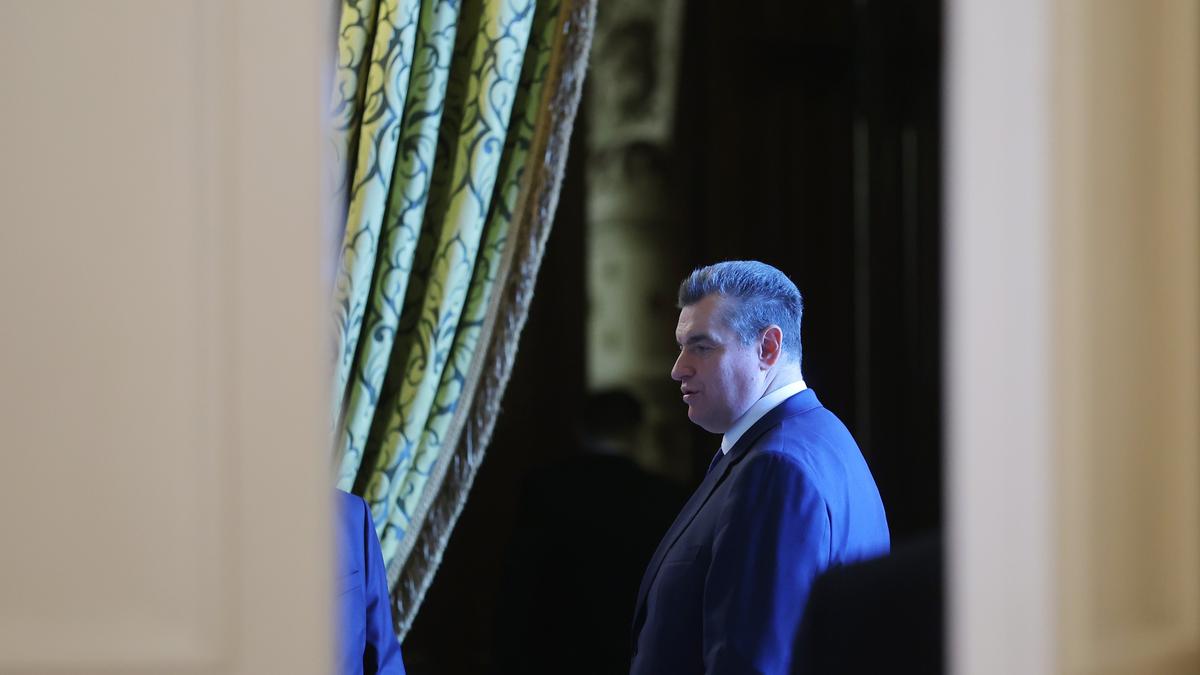Over a year since the death of Vladimir Zhirinovsky, the clownish founder of Russia’s ultranationalist Liberal Democratic Party (LDPR), his long shadow still casts a pall over his longtime acolyte and successor, Leonid Slutsky.
Amid a severe personality vacuum in the upper echelons of the LDPR, the party last week nominated Slutsky to be its candidate in March’s presidential election, making him the first name all but guaranteed to make the ballot other than Russia’s president for life, Vladimir Putin.
While a normal presidential election might be an ideal forum for a politician to build their brand and convince the electorate of their charm and charisma, that would appear to be a moot point for Slutsky, who since being elected to Russia’s State Duma in 1999 has repeatedly demonstrated that he has neither.
Slippery and sleazy
Since its headline-grabbing quasi-fascist early years, the misleadingly named Liberal Democratic Party of Russia, which was founded by Zhirinovsky in 1992, has settled into its role as an integral part of Russia’s managed democracy, in which multiple parties contest elections to give voters an impression of choice. While the charismatic Zhirinovsky was an exception to the unwritten rule that the leaders of the so-called “systemic parties” should be insipid and uninspiring, Slutsky is ideally suited to the role.
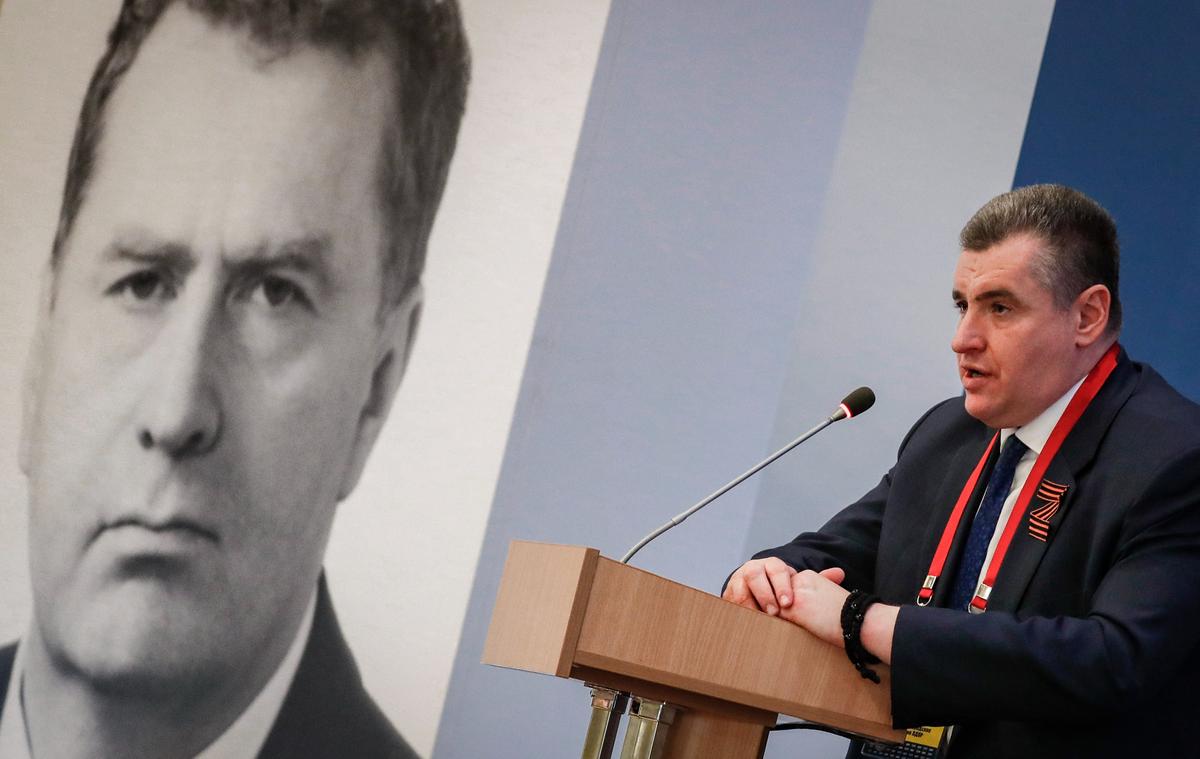
Leonid Slutsky addresses an LDPR congress under the gaze of late party founder Vladimir Zhirinovsky in Moscow on 27 May 2022. Photo: EPA-EFE/YURI KOCHETKOV
Barely able to inspire his own party, let alone an entire country, Slutsky even appeared at the St. Petersburg International Economic Forum in June alongside an AI chat bot version of Zhirinovsky, prompting speculation from the commentariat that Slutsky was unable to perform the role alone.
“Slutsky is slippery,” says Berlin-based political scientist Nikolay Petrov. “The party’s voters are used to having Zhirinovsky as their commanding, quick-witted, bright, and inexperienced leader. In that sense, Slutsky is his complete opposite.”
While he may not be particularly charismatic, Slutsky is at least known to the Russian public, having been at the centre of a sexual harassment scandal that took place in Russia’s State Duma in 2018, when three journalists accused him of inappropriate sexualised behaviour.
Among them was BBC News Russian journalist Farida Rustamova, who recounted visiting Slutsky’s office for a comment on the visit of far-right French politician Marine Le Pen to Russia. During the conversation, according to Rustamova, Slutsky made a series of inappropriate comments that culminated in him touching her inappropriately.
“Slutsky constantly harasses young female journalists,” Dozhd’s Yelizaveta Antonova subsequently informed Zhirinovsky during an interview, adding “the entire State Duma is aware of it.” Zhirinovsky promised to look into the matter.
The Duma’s ethics commission ultimately deemed the accusations insufficiently convincing and decided not to take any disciplinary measures against Slutsky. He dismissed the claims as “provocations” and said he was being smeared as a “Russian Harvey Weinstein”.
System addict
Slutsky, 55, is known to have two daughters, but otherwise remains very much in the shadows and avoids discussion of his private life. He began his career working at Russia’s Supreme Soviet, the forerunner of the State Duma, where he made numerous valuable connections. Indeed, his skill at networking has played an important role in his political trajectory, to the point that in one 2015 interview he described his ability to make friends as his best quality.
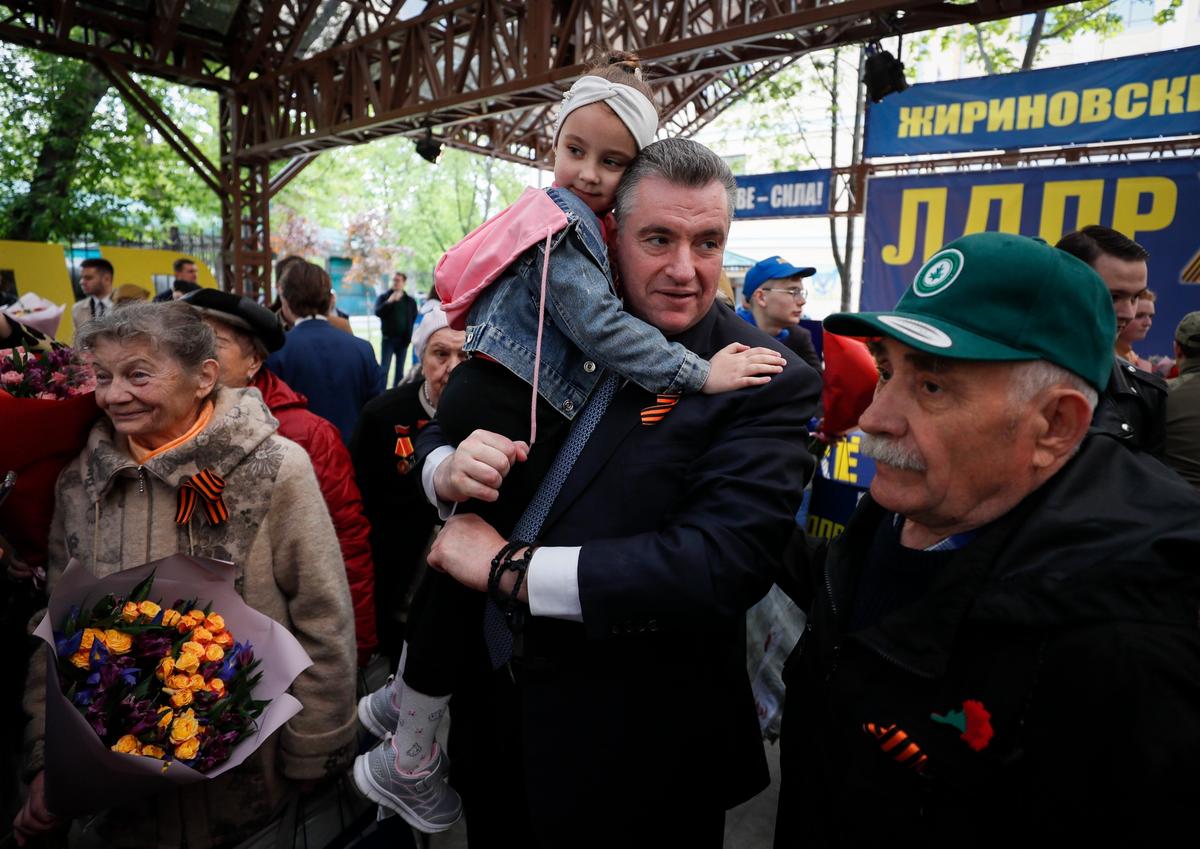
Slutsky attends a Victory Day rally in Moscow, 9 May 2023. Photo: EPA-EFE/YURI KOCHETKOV
In 2016, Slutsky was appointed chairperson of the State Duma’s Committee on International Affairs, largely due to a personal endorsement to Putin made by Zhirinovsky, who later compared him to “Kissinger during the Carter era” for his active involvement in international affairs.
While the Committee on International Affairs performs fairly mundane tasks such as inter-parliamentary relations and receiving official delegations, its profile has grown since Russia was first sanctioned in 2014, Petrov says, adding “were another, more prominent politician to lead the committee, they could potentially use it as a power base, and could even have disagreements with the Kremlin on certain matters.” No such threat appears to have been detected from Slutsky, however.
As the committee chair, Slutsky has worked hard to legitimise Russia’s illegal 2014 annexation of Crimea, and the various international delegations he has brought to the peninsula — most notably a group of French MPs in 2015 — are seen as his main achievement in that role. Indeed, despite being a member of the State Duma for over 20 years, Slutsky hasn’t been responsible for proposing any notable legislation, he rarely makes controversial statements, and his position is always aligned with that of the Kremlin.
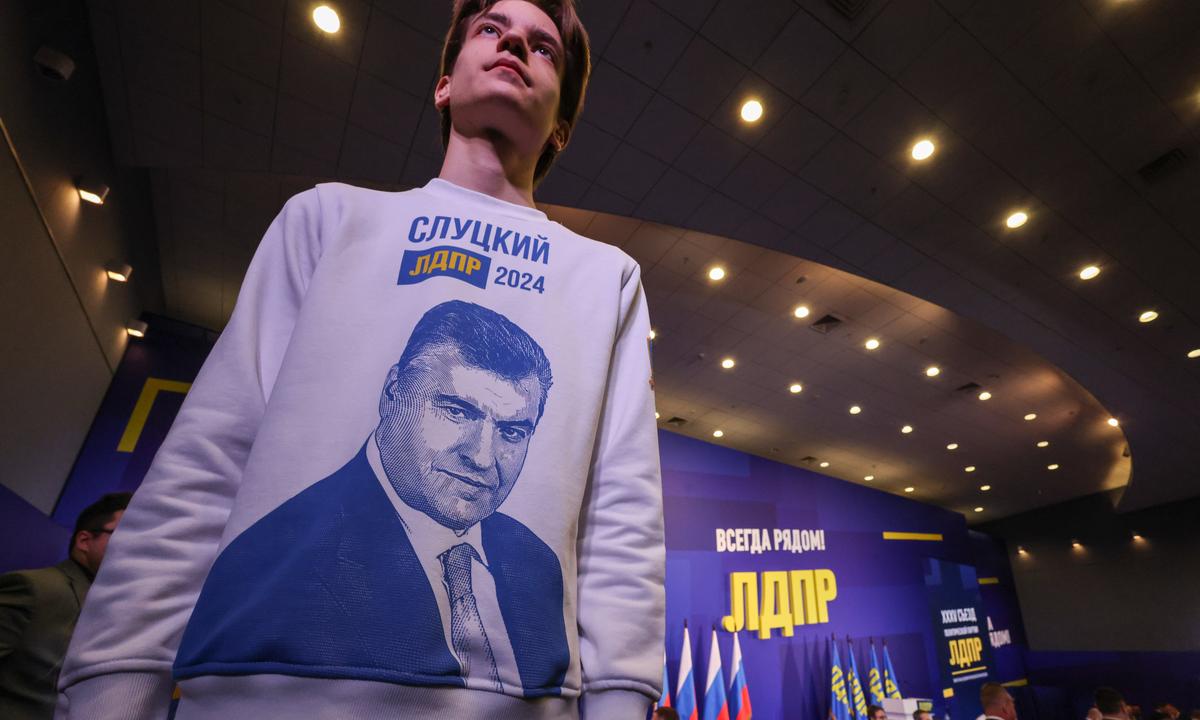
A volunteer shows his support for Slutsky during the party’s pre-election congress. Photo: EPA-EFE / SERGEI ILNITSKY
“Slutsky is a very business-oriented politician,” says Petrov. “He doesn’t possess anything that he could use independently. In this sense, he is entirely dependent on the Kremlin, more so than he was on Zhirinovsky.”
Slutsky’s wealth has attracted significant media attention, including from Alexey Navalny’s Anti-Corruption Foundation, whose 2018 investigation into the deputy revealed that Slutsky owned assets whose value greatly exceeded his parliamentary income, including multiple Bentleys that he would have had to “starve himself for six years to afford”.
“He’s a wealthy man who loves to live the life of a show-off”, says Petrov.
Loss leader
Many LDPR members were on the fence about Slutsky’s election as head of the party following Zhirinovsky’s death last year. In June, a party source told independent news outlet Meduza that the LDPR was experiencing a serious rift, with the party divided into pro- and anti-Slutsky camps, the latter believing that “Slutsky does everything wrong, behaves stupidly and put the party in jeopardy".
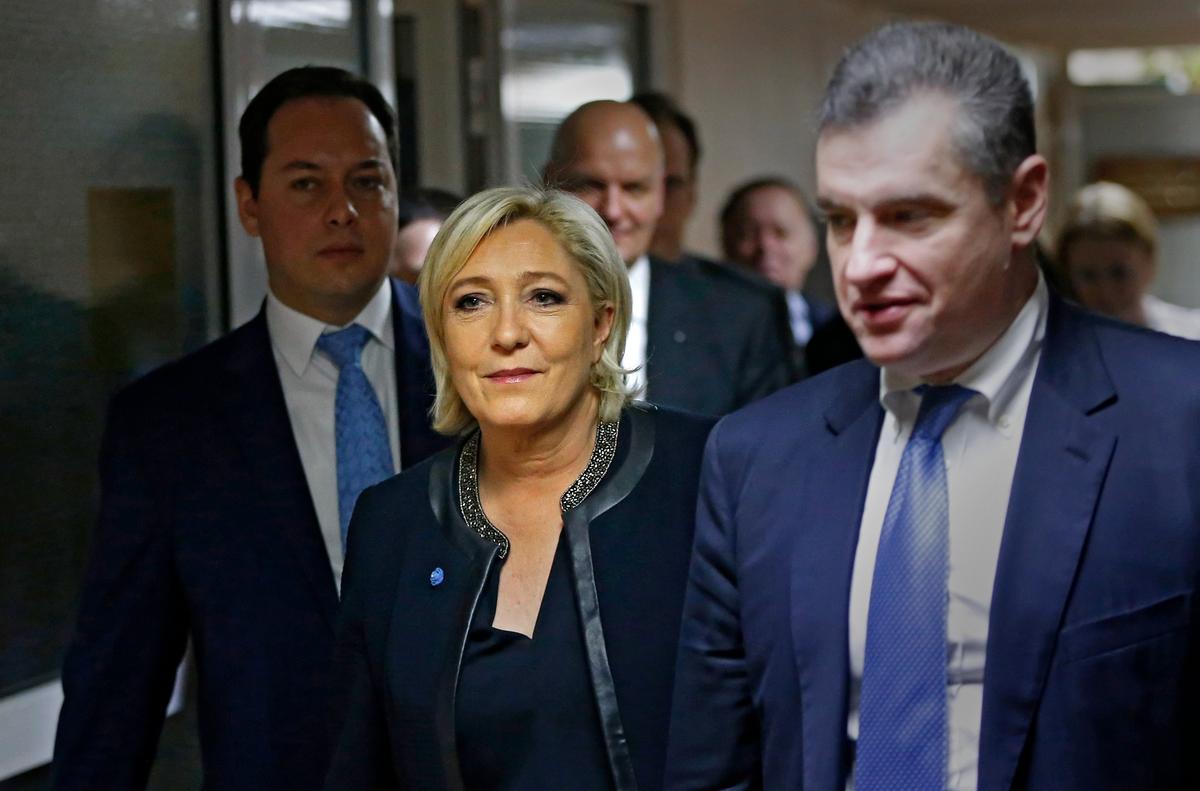
Marine Le Pen with Slutsky during their meeting at the Russia's State Duma in Moscow, Russia, 24 March 2017. Photo: EPA / YURI KOCHETKOV
Earlier this month, however, the LDPR announced a new leadership structure, a sign that Slutsky successfully resolved the party’s split by sidelining those in the Zhirinovsky old guard who have proven themselves to be disloyal, Petrov believes, and bringing in new people who will see Slutsky as their patron.
Given that Russian elections are designed only to legitimise the permanent rule of Vladimir Putin, Slutsky’s presidential bid is ultimately just another element to the elaborate and time-consuming charade that Russian elections have become.
In the last presidential election in 2018, Zhirinovsky only polled 5.7% of the vote despite his charisma and long relationship with the Russian public. The fact that Slutsky, despite being what Petrov calls “a pale electoral copy of Zhirinovsky”, is expected to get approximately the same number of votes in March as his predecessor did in 2018 perfectly illustrates how irrelevant voters have become in Russian elections.
Join us in rebuilding Novaya Gazeta Europe
The Russian government has banned independent media. We were forced to leave our country in order to keep doing our job, telling our readers about what is going on Russia, Ukraine and Europe.
We will continue fighting against warfare and dictatorship. We believe that freedom of speech is the most efficient antidote against tyranny. Support us financially to help us fight for peace and freedom.
By clicking the Support button, you agree to the processing of your personal data.
To cancel a regular donation, please write to [email protected]
